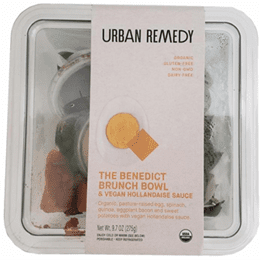-
Articles + –
The importance of the breakfast occasion is shrinking. In 2018, half of consumers agreed breakfast is more important than lunch or dinner, compared to 55% in 2014. Breakfast is no longer a priority for some Americans as they are strapped for time and sometimes skip breakfast altogether.
Eating habits also continue to evolve as mealtimes shift to snack times. Nearly three-quarters of consumers say they snack in the morning, highlighting the need for light and portable foods that can be eaten at the start of the day according to Mintel research on restaurant breakfast and brunch trends. Diners are also interested in eating non-breakfast foods at breakfast and breakfast foods throughout their day, opening opportunity for retailers and restaurant operators alike to appeal to these diverse occasions.
What consumers want
Convenience, indulgence, and health
Nearly six in 10 Americans have dined out for breakfast or brunch in the last three months, opting for the convenience and affordability of fast food and coffee shops during the week, and the social and indulgent experience of full service restaurants on the weekend.
In addition to convenience, diners are looking for healthy breakfast foods that are high in protein, contain fruit and are low in sugar. Dishes featuring high protein and fresh ingredients align with diners’ preference for filling, flavorful and fresh breakfast items.
Variety and portability
Menu variety and quality ingredients are vital to appeal to diners who find breakfast combos and premium or housemade ingredients most appealing on breakfast and brunch menus. In addition, offering seasonal, local and unique ingredients are all ways operators can differentiate themselves from competitors.
Restaurants are the top source of food eaten in transit for breakfast, and a quarter of breakfast eaters want to see more grab-and-go options. Portable options such as customizable breakfast sandwiches, donut sticks and protein-rich smoothies enable diners to fuel up while on the go.
What’s next?
Global influence
Only four in 10 breakfast eaters prefer traditional breakfast foods over trendy options, highlighting the endless opportunities for flavor and format innovation. Diners are increasingly exposed to international cuisines, whether at foodservice or retail, and we are seeing strong growth in these offerings on breakfast and brunch menus. Fusion, Middle Eastern and South American breakfast and brunch dishes grew on US menus from Q4 2015-2018, according to Mintel Menu Insights. Operators are adding an international twist to traditional dishes such as eggs Benedict made with a Colombian arepa, or French toast made with Japanese milk bread.
Indulgent brunches

Tasty plant-based options
As interest in plant-based foods continues to grow, operators are proving these alternatives don’t have to feel like a trade-off. Veggie Grill’s All-day Breakfast Burrito features JUST’s scrambled egg made from mung beans, while retail brand Urban Remedy offers a Benedict Brunch Bowl with vegan hollandaise sauce and eggplant “bacon.”
Unique coffees

What we think
Promoting the importance of breakfast and focusing on snackable breakfast items will be important to help traditional and innovative breakfast items succeed. Knowing that consumers’ needs differ based on day of the week means operators and manufacturers must balance health with indulgence, and convenience with leisure. Finally, it will remain important to promote breakfast foods beyond the morning hours. Consider offering a varied menu with both traditional and non-traditional items to fit diners’ varying needs throughout the day.

Amanda Topper is the Director of US Research: Food, Drink, Foodservice, Flavors & Ingredients, responsible for overseeing all of Mintel’s foodservice offerings, as well as providing insight and competitive analysis across scheduled deliverables, and client and industry presentations.
-
Mintel StoreGet smart fast with our exclusive market research reports, delivering the latest data, innovation, trends and strategic recommendations....View reports
-
Mintel LeapMintel Leap is a revolutionary new AI-powered platform that will transform your research process....Book a demo







































